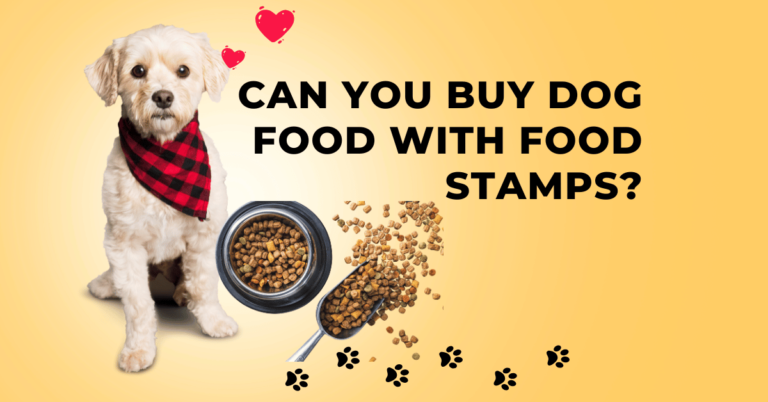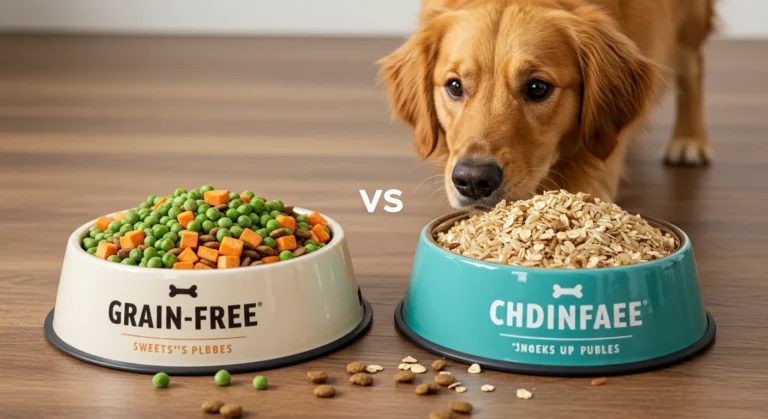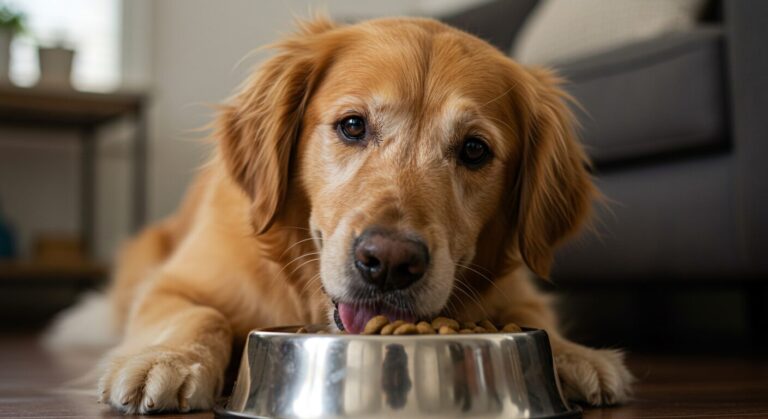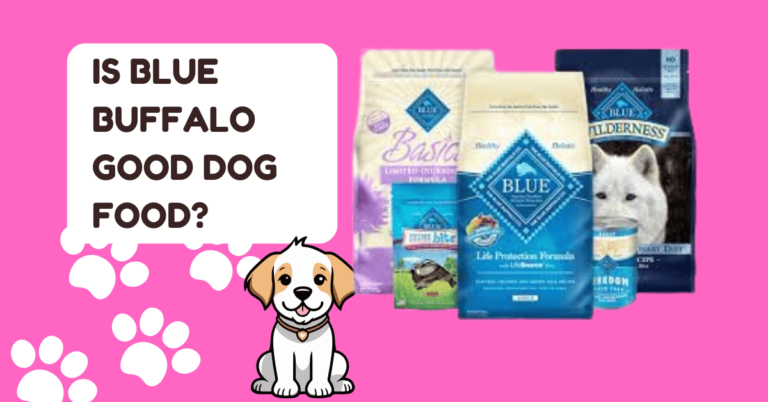Safe & Toxic Human Foods for Dogs Vet-Approved List of 57 Foods
Many dog owners love sharing food with their pets, but not all human foods are safe for dogs. Some are healthy and offer real benefits like carrots for clean teeth or plain rice for upset stomachs. But others, like chocolate or grapes, can be toxic and even life-threatening.
In this simple guide, you’ll discover 35 human foods that are safe for dogs, along with how to serve them and what to avoid. You’ll also learn about 22 toxic foods that every dog owner should keep far away from the bowl.

Even with safe foods, moderation matters. A healthy snack for one dog might cause problems for another. That’s why it’s always smart to check with your vet before adding anything new to your dog’s meals.
Feeding your dog safe human food isn’t just about treats it’s about keeping them happy, healthy, and strong. This article will help you choose the right foods, spot the wrong ones, and avoid common mistakes. If you love your dog and want to keep them safe, this guide is for you.
Let’s make sure every bite your dog takes is the right one.
35 Safe Human Foods for Dogs
Introducing healthy human foods to your dog’s diet can provide added nutrients, variety, and even enjoyment but only if you know what’s safe. Below is a list of 35 vet-approved human foods your dog can safely eat, complete with benefits and safety tips for each.
1. Carrots
Carrots are a fantastic snack for dogs! They’re packed with vitamin A, which helps to maintain good eyesight. They’re also rich in fiber, which is great for digestion. Carrots are crunchy, so they can help to clean your dog’s teeth and freshen their breath. You can serve them raw or cooked. Just chop them into small pieces to avoid any choking hazard, especially for smaller dogs.
While carrots are healthy, it’s essential to make sure you serve them in moderation. Too many carrots could lead to an upset stomach due to the fiber content. Always supervise your dog when they eat carrots, especially if they’re raw, to avoid choking.
2. Apples
Apples are another safe and nutritious snack for dogs. They are high in fiber, which aids digestion and promotes a healthy gut. Apples also contain vitamin C, which supports the immune system. Plus, they are low in calories, making them a healthy treat. Simply remove the seeds and core before feeding your dog, as these parts contain cyanide, which is harmful to dogs.
When feeding apples, always remove the seeds and core. These parts can cause digestive problems, and if ingested in large quantities, can lead to poisoning. Stick to small slices to avoid choking, especially for small or toy breed dogs.
3. Blueberries
Blueberries are an excellent choice for a doggie snack. They’re packed with antioxidants, which help to protect cells from damage and reduce inflammation. These tiny fruits are also low in calories, making them a perfect choice for dogs who need to watch their weight. Blueberries are high in fiber, which is also good for your dog’s digestive health.

Although blueberries are generally safe for dogs, always serve them in moderation. Eating too many could cause some dogs to experience stomach upset. It’s best to give just a few berries at a time and monitor how your dog reacts.
4. Pumpkin
Pumpkin is very beneficial for dogs. It’s a great source of fiber, which helps with digestion and can alleviate constipation or diarrhea. The nutrients in pumpkin, such as vitamin A and beta-carotene, are good for your dog’s overall health, supporting a strong immune system. It’s important to feed pumpkin that is plain and cooked. Avoid canned pumpkin that contains added sugar, spices, or artificial flavors.
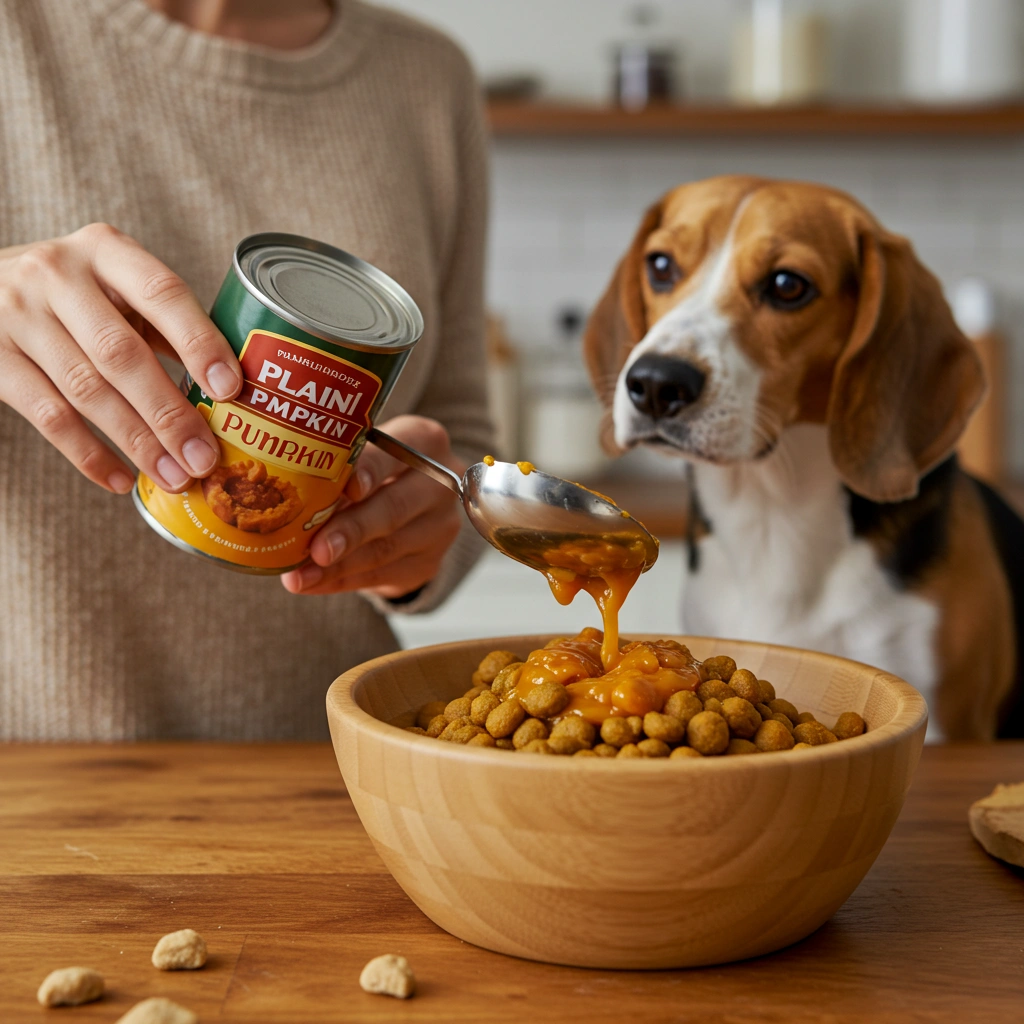
Too much pumpkin can lead to an upset stomach or diarrhea. Make sure you serve it in small amounts to avoid any digestive issues. Only feed your dog cooked pumpkin raw pumpkin can be hard for them to digest
5. Green Beans
Green beans are a low-calorie, high-fiber vegetable that is excellent for dogs. They are packed with vitamins A, C, and K, which help with immunity and bone health. Green beans can be served fresh or cooked. Since they are low in calories, they are perfect for dogs who need to maintain a healthy weight. Plus, the crunchiness can help keep your dog’s teeth clean.
Green beans should be served plain avoid seasoning them with garlic, onions, or other harmful ingredients. Also, like with any food, feed them in moderation. Too many green beans can cause gas or digestive discomfort.
6. Sweet Potatoes
Sweet potatoes are a nutritious addition to your dog’s diet. They are rich in beta-carotene, which helps support your dog’s vision and immune system. They also contain fiber, which aids digestion. Cooked sweet potatoes are easily digestible and provide a natural source of energy. Just be sure to cook them thoroughly and serve them without any added salt or seasoning.
Sweet potatoes should always be served cooked, as raw sweet potatoes can be difficult for dogs to digest. Keep portions small to avoid digestive upset. Sweet potatoes are high in carbs, so they should be fed in moderation, especially for dogs prone to weight gain.
7. Oatmeal
Oatmeal is a healthy and digestible grain for dogs, especially when they have an upset stomach. It’s a good source of soluble fiber, which helps regulate digestion and maintain a healthy bowel. Oatmeal also provides vitamins and minerals like vitamin B and iron. Be sure to serve it plain, without any sugar, milk, or other additives.
While oatmeal is safe, it should only be served in small amounts as part of a balanced diet. Some dogs may be sensitive to grains, so introduce oatmeal slowly and watch for any signs of allergies or upset stomach.
8. White Rice
White rice is a great option when your dog has an upset stomach. It’s easy to digest and can help firm up your dog’s stool if they are experiencing diarrhea. White rice is also low in fiber, which can be easier on a dog’s digestive system when they’re not feeling well. Always serve it cooked and plain, without any added spices or oils.
Rice should only be fed in small amounts to dogs with digestive issues. It’s not a food that should be fed regularly because it lacks many of the nutrients your dog needs. If you use rice to help with diarrhea, be sure to mix it with a protein source like chicken to provide balanced nutrition.
9. Chicken (Cooked, Unseasoned)
Chicken is a great source of lean protein, which is essential for muscle growth and energy. It’s also low in fat, making it a healthy option for dogs who need to maintain a lean body weight. Serve chicken cooked, with no seasonings, onions, or garlic, as these can be toxic to dogs. Chicken is a versatile food that pairs well with other healthy foods like rice or sweet potatoes.

Always ensure the chicken is thoroughly cooked to avoid any risk of salmonella or bacteria. Avoid giving your dog chicken bones, as they can splinter and cause choking or internal injury. Stick to lean, boneless, skinless chicken breast for the safest option
10. Turkey (Plain, Boneless)
Turkey is a lean, protein-rich food that dogs can enjoy. It’s especially good for dogs who are on a diet because it’s low in fat and calories. Turkey is also a great source of vitamins and minerals, like B vitamins and zinc. Make sure to remove all the bones and skin before feeding it to your dog, and always serve it plain with no seasonings or additives.
Turkey should be fed in moderation, especially if your dog has a sensitive stomach. Like chicken, make sure to cook the turkey thoroughly to avoid any potential bacterial contamination. Be cautious of serving turkey with any added ingredients like onions, garlic, or butter, as these can be harmful to dogs.
11. Bananas
Bananas are a tasty and nutritious snack for dogs. They are rich in potassium, which helps to maintain healthy muscle and nerve function. Bananas also contain fiber, which promotes good digestion and helps regulate bowel movements. This makes them a great treat for dogs who may be experiencing digestive issues. The natural sugars in bananas can provide a quick energy boost.
Bananas should be fed in moderation, as they are high in sugar and can cause weight gain if given in excess. Too much banana can lead to an upset stomach due to its high fiber content. Make sure to peel the banana before feeding it to your dog to avoid choking on the peel.
12. Cucumbers
Cucumbers are low-calorie and hydrating, making them an excellent choice for a refreshing dog treat. They are rich in vitamins K, C, and B, which support overall health, and the high water content helps keep your dog hydrated, especially in warmer weather. Cucumbers are crunchy, which also helps clean your dog’s teeth as they chew.
Though cucumbers are safe, they should be served in moderation. Eating too many cucumbers could lead to stomach upset or diarrhea in some dogs. Always cut them into small, bite-sized pieces to reduce any choking risk, especially for smaller breeds.
13. Peanut Butter
Peanut butter is a favorite treat for many dogs. It’s a good source of healthy fats and protein, which help support energy levels and muscle health. The healthy fats in peanut butter can also help to keep your dog’s coat shiny and healthy. Make sure to choose peanut butter that is free of xylitol, an artificial sweetener that is toxic to dogs.
Although peanut butter is safe in moderation, it is calorie-dense, so it should only be given as an occasional treat to prevent weight gain. Always check the ingredients to ensure the peanut butter does not contain xylitol, which can be deadly to dogs. Limit the amount given to avoid digestive issues.
14. Spinach
Spinach is a green leafy vegetable that provides a wealth of nutrients like iron, vitamins A, C, and K, which are beneficial for your dog’s health. It also has antioxidants that support the immune system and promote overall well-being. Spinach is also a great source of fiber, which helps to regulate digestion.
While spinach is safe in small amounts, it contains oxalates, which can interfere with calcium absorption and potentially contribute to kidney issues if consumed in large quantities. Feed spinach in moderation and avoid giving it to dogs with kidney problems.
15. Pineapple
Pineapple is a tropical fruit that’s safe for dogs to eat in small amounts. It’s packed with vitamin C, antioxidants, and fiber, which help boost the immune system, aid digestion, and keep the digestive system running smoothly. Pineapple also contains bromelain, an enzyme that can aid in the breakdown of proteins, which can be helpful for your dog’s digestion.
Be sure to remove the tough outer skin and the core before giving pineapple to your dog. The core can be tough to digest and may cause an upset stomach. As with any fruit, feed pineapple in moderation to prevent any digestive issues or an overload of sugar.
16. Watermelon (Seedless)
Watermelon is a hydrating, low-calorie treat that dogs love, especially in hot weather. It’s full of vitamins A, B6, and C, which support your dog’s overall health and immune system. The high water content in watermelon helps keep your dog hydrated and is a great way to cool them off. Watermelon is also low in fat, making it a healthy snack.
Always make sure to remove the seeds and rind from the watermelon before offering it to your dog. The seeds can cause choking or intestinal blockages, and the rind is tough to digest. Serve watermelon in small, bite-sized pieces to prevent choking
17. Eggs (Cooked)
Eggs are a high-quality protein source, providing essential amino acids that help support muscle growth and repair. They also contain healthy fats and vitamins, such as vitamin A, B12, and riboflavin. Scrambled or boiled eggs are a great addition to your dog’s diet, offering a tasty and nutritious treat.
Eggs should always be served cooked to avoid the risk of salmonella. Do not add any seasoning, salt, or oil when cooking eggs for your dog, as these can be harmful. Feed eggs in moderation, as they are high in fat, which could lead to weight gain if given too often.
18. Yogurt (Plain, Unsweetened)
Plain yogurt is a good source of calcium, protein, and probiotics, which support your dog’s digestive health. The probiotics in yogurt can help maintain a healthy balance of bacteria in your dog’s gut, improving digestion and promoting a healthy immune system. Yogurt is also a good source of vitamins B2 and B12.
Make sure the yogurt you serve is plain and does not contain added sugars or artificial sweeteners like xylitol, which is toxic to dogs. Some dogs may be lactose intolerant, so introduce yogurt slowly and watch for signs of digestive upset, such as diarrhea or gas.
19. Cantaloupe
Cantaloupe is another hydrating fruit that dogs can enjoy. It’s rich in vitamins A, C, and B6, which are essential for good vision, immune function, and healthy metabolism. Cantaloupe also contains fiber, which helps with digestion. The natural sweetness of cantaloupe makes it an irresistible treat for dogs.
Remove the seeds and rind of the cantaloupe before serving it to your dog, as these parts can be difficult to digest and may cause choking. Like other fruits, cantaloupe should be fed in moderation to avoid overloading your dog with sugar.
20. Zucchini
Zucchini is a healthy, low-calorie vegetable that is safe for dogs to eat. It’s rich in vitamins and minerals like vitamin C, potassium, and folate. Zucchini is also high in water, which helps with hydration. It’s a great snack for dogs on a diet, as it’s low in calories and full of beneficial nutrients.
Zucchini should be served in small, bite-sized pieces to avoid choking, especially for smaller dogs. Although zucchini is safe, it should be given in moderation, as too much of any vegetable can lead to digestive upset.
21. Peas
Peas are a nutrient-packed snack for dogs. They’re a great source of vitamins A, C, and K, and are rich in antioxidants that support a dog’s immune system and overall health. Peas are also high in fiber, which helps regulate digestion. They contain plant-based protein, making them a great option for dogs on a vegetarian or limited meat diet. Additionally, peas are low in calories, making them an ideal snack for dogs that need to maintain a healthy weight.
When feeding peas, be sure to serve them cooked or thawed from frozen, and avoid offering canned peas that contain added salt or preservatives.
22. Mango
Mangoes are delicious and packed with nutrients, making them a great treat for your dog. They are rich in vitamins A, C, and E, which help to improve vision, support the immune system, and protect against cell damage. Mangoes are also high in fiber, which promotes good digestion. The natural sweetness of mango makes it an irresistible treat for most dogs.
However, always remove the pit from the mango before offering it to your dog. The pit can be a choking hazard and contains cyanide, which is toxic to dogs. Only offer small amounts of mango to prevent digestive upset due to its high sugar content.
23. Kale
Kale is a highly nutritious vegetable that can be safely included in your dog’s diet. It’s packed with vitamins A, C, and K, which support your dog’s immune system, vision, and bone health. Kale is also a good source of antioxidants that help fight free radicals and reduce inflammation. In addition, it contains fiber, which aids digestion.
Though it’s safe, kale should be fed in moderation, as it contains calcium oxalates, which can contribute to kidney issues if consumed in excess. To ensure safety, serve kale cooked or steamed, and always avoid adding any seasoning.
24. Apricots
Apricots are another sweet and nutritious fruit that dogs can enjoy. They are rich in vitamins A and C, which help boost your dog’s immune system and support overall health. Apricots also contain fiber, which helps with digestion and maintaining a healthy gut. The juicy flesh of the apricot is soft and easy for dogs to chew.
However, it’s crucial to remove the pit before offering apricots to your dog. The pit can be a choking hazard and, like other stone fruits, contains cyanide, which is toxic. Feed apricots in moderation to avoid too much sugar, which could upset your dog’s stomach.
25. Coconut
Coconut is a great treat for dogs due to its healthy fats and fiber content. It provides a natural source of energy and can help keep your dog’s skin and coat healthy and shiny. Coconut is also rich in vitamins C and E, which support the immune system. It’s also known for having antimicrobial properties that help fight infections.
Make sure to feed only fresh, unsweetened coconut to your dog. Avoid giving them coconut milk, as it can be too rich and cause digestive upset. The hard outer shell of coconut should never be given to dogs, as it can pose a choking hazard.
26. Raspberries
Raspberries are a delicious, low-calorie fruit that is perfect for dogs. They’re packed with antioxidants that support overall health and have anti-inflammatory properties, which can help reduce joint pain. Raspberries are also high in fiber, which aids digestion and promotes regular bowel movements.
Though raspberries are healthy, they contain small amounts of xylitol, a substance that can be toxic to dogs in large quantities. Therefore, they should only be given in small amounts. It’s also important to remember that raspberries are high in natural sugar, so overfeeding them could lead to weight gain or digestive problems.
27. Chia Seeds
Chia seeds are tiny but packed with nutrients that can benefit your dog. They are high in omega-3 fatty acids, which support heart health and reduce inflammation. Chia seeds also contain fiber, which helps with digestion and promotes regular bowel movements. They are also rich in antioxidants that support your dog’s immune system.
When serving chia seeds, it’s important to soak them in water first before offering them to your dog. This helps prevent any choking hazards and makes them easier to digest. A small amount of chia seeds can be added to your dog’s food, but it’s best to start with a tiny portion to see how your dog reacts.
28. Beets
Beets are a nutritious vegetable that provides a number of health benefits for dogs. They are rich in fiber, which aids digestion and helps maintain healthy bowel movements. Beets are also a good source of vitamins A and C, which support the immune system and improve overall health. They contain antioxidants that help protect cells from damage.
Beets should be served cooked and in small amounts to avoid any digestive upset. Some dogs may be sensitive to beets, so it’s important to introduce them slowly into their diet. Avoid feeding your dog pickled beets, as they contain high levels of sodium and other harmful additives.
29. Squash
Squash, whether it’s zucchini, butternut, or acorn squash, is an excellent vegetable for dogs. It’s full of fiber, which aids digestion and helps maintain a healthy weight. Squash also provides vitamins A and C, which support your dog’s immune system and promote good vision. The high water content in squash makes it a hydrating food that can help keep your dog hydrated, especially in warmer months.
Squash should always be served cooked and in small pieces to avoid choking hazards. Avoid seasoning the squash with salt, butter, or other ingredients, as they can be harmful to dogs. Too much squash can also cause an upset stomach, so feed it in moderation.
30. Asparagus
Asparagus is a green vegetable that is safe and nutritious for dogs. It’s rich in fiber, which supports healthy digestion and regular bowel movements. Asparagus is also packed with vitamins A, C, and K, which promote overall health and immune function. It’s a great low-calorie snack for dogs who need to maintain a healthy weight.
While asparagus is generally safe, it should be served cooked and cut into small, manageable pieces to prevent choking. Raw asparagus can be tough for dogs to digest and may cause digestive issues. Introduce asparagus slowly to ensure your dog doesn’t have any adverse reactions.
31. Pears
Pears are a sweet and juicy fruit that is safe for dogs to eat in moderation. They are rich in fiber, which aids in digestion and helps regulate bowel movements. Pears also contain vitamins A and C, which support your dog’s immune system and overall health. The natural sweetness of pears makes them a great treat for most dogs.
Before giving pears to your dog, always remove the core and seeds. The seeds contain cyanide, which is toxic to dogs if consumed in large amounts. Pears should be served in small, bite-sized pieces to prevent choking, especially for smaller breeds.
32. Carrots
Carrots are a crunchy, low-calorie treat that is great for dogs. They are packed with vitamin A, which is important for maintaining healthy vision and skin. Carrots also contain fiber, which helps regulate digestion and promotes a healthy gut. The natural crunchiness of carrots can help clean your dog’s teeth as they chew, promoting good dental hygiene.
Carrots can be served raw or cooked, but be sure to cut them into small, bite-sized pieces to reduce the risk of choking. While carrots are generally safe, too many raw carrots can cause digestive upset due to their high fiber content.
33. Tomatoes
Ripe tomatoes are safe for dogs to eat in moderation. They are rich in vitamins A and C, which support the immune system and promote healthy skin. Tomatoes also contain antioxidants, such as lycopene, which help protect the body from free radical damage. This makes them a healthy addition to your dog’s diet in small amounts.
Never give your dog unripe tomatoes or any green parts of the tomato plant (like leaves or stems), as they contain solanine, which is toxic to dogs. Serve ripe tomatoes in small pieces, and monitor your dog for any signs of digestive upset.
34. Cantaloupe
Cantaloupe is a refreshing, hydrating fruit that is safe for dogs to eat in moderation. It’s packed with vitamins A and C, which support vision and immune function. Cantaloupe is also rich in water, helping to keep your dog hydrated, especially during the warmer months. Its natural sweetness makes it a tasty treat that most dogs love.
When offering cantaloupe to your dog, be sure to remove the seeds and rind. These parts can cause digestive issues or become choking hazards. Serve the cantaloupe in small, manageable pieces to avoid any risks.
35. Green Peppers
Green peppers are a great vegetable to include in your dog’s diet. They are rich in vitamins A, C, and E, which support immune function and overall health. Green peppers also contain fiber, which helps with digestion and regular bowel movements. The antioxidants in green peppers help protect your dog’s body from free radical damage.
Before serving green peppers, make sure to remove the seeds and cut the pepper into small, bite-sized pieces to avoid choking hazards. While green peppers are generally safe for dogs, they should be given in moderation to avoid any digestive upset. Always serve them fresh or lightly cooked without any added seasoning.
22 Toxic Foods Dogs Must Avoid
Toxic foods for dogs are those that contain substances harmful to a dog’s health. These foods can cause poisoning, digestive issues, organ damage, or even death if ingested. 22 Toxic Foods Dogs Must Avoid
- Chocolate
- Grapes & Raisins
- Onions & Garlic
- Avocado
- Xylitol (Artificial Sweetener)
- Alcohol
- Coffee & Caffeine
- Macadamia Nuts
- Raw Yeast Dough
- Bones (Cooked)
- Citrus (Large Amounts)
- Cherries (Pits & Stems)
- Mushrooms (Wild Varieties)
- Rhubarb
- Nutmeg
- Salt (Excess)
- Raw Eggs
- Raw Meat (Salmonella/E. Coli Risk)
- Fatty Foods (Bacon, Fried Foods)
- Ice Cream (Dairy/Lactose Issues)
- Cinnamon
- Tobacco & Nicotine
1. Chocolate
Chocolate is one of the most well-known toxic foods for dogs. It contains theobromine, a stimulant similar to caffeine that dogs cannot metabolize effectively. Depending on the type of chocolate and the size of the dog, consuming even small amounts can be harmful. Dark chocolate, in particular, contains higher levels of theobromine and is much more dangerous than milk chocolate.
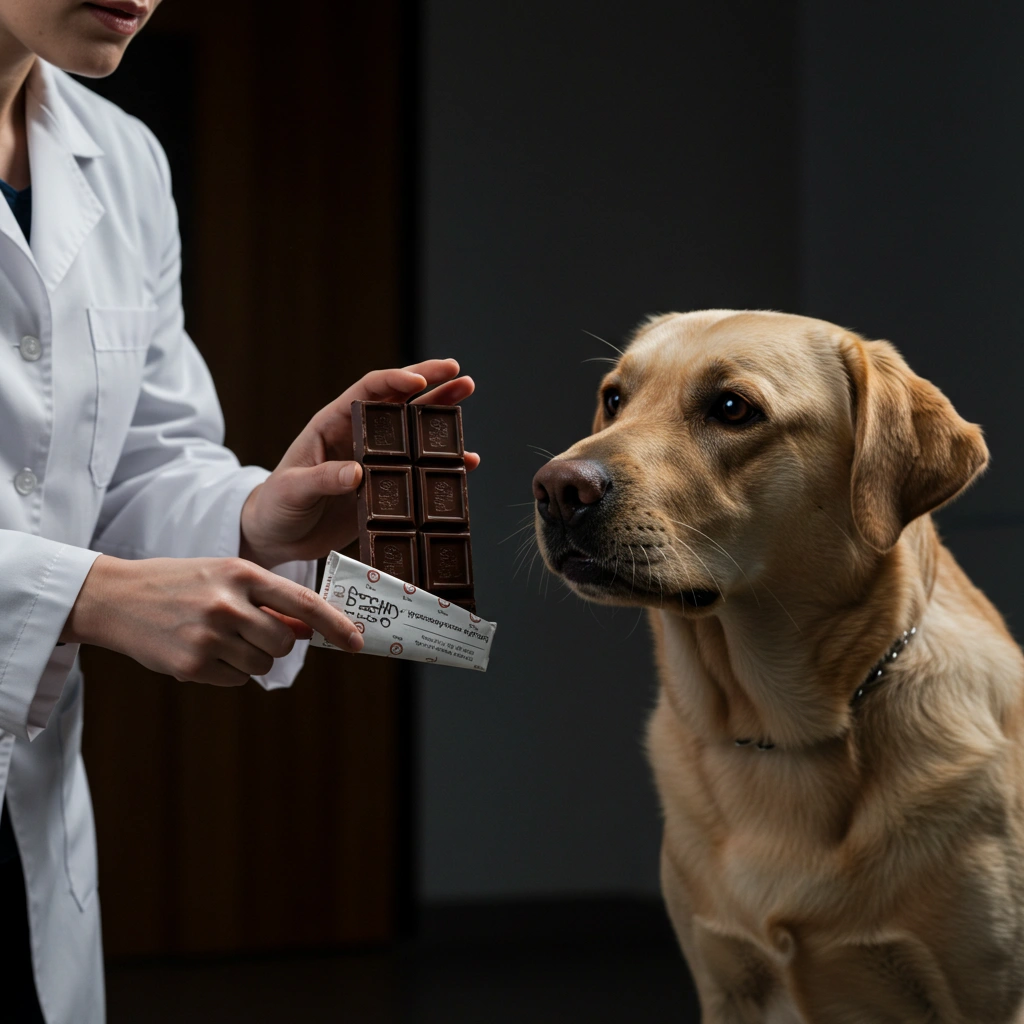
Risks & Symptoms:
- Vomiting, diarrhea
- Increased heart rate
- Restlessness or hyperactivity
- Muscle tremors or seizures
- In severe cases, chocolate poisoning can lead to death.
If your dog has eaten chocolate, contact a vet immediately for treatment, as it can be life-threatening if not addressed promptly.
2. Grapes & Raisins
Although the exact toxin in grapes and raisins remains unknown, these fruits can cause sudden kidney failure in dogs. Even small amounts can be dangerous, and some dogs are more sensitive than others. The severity of the reaction can vary, and there is no known safe amount of grapes or raisins that a dog can eat without risk.
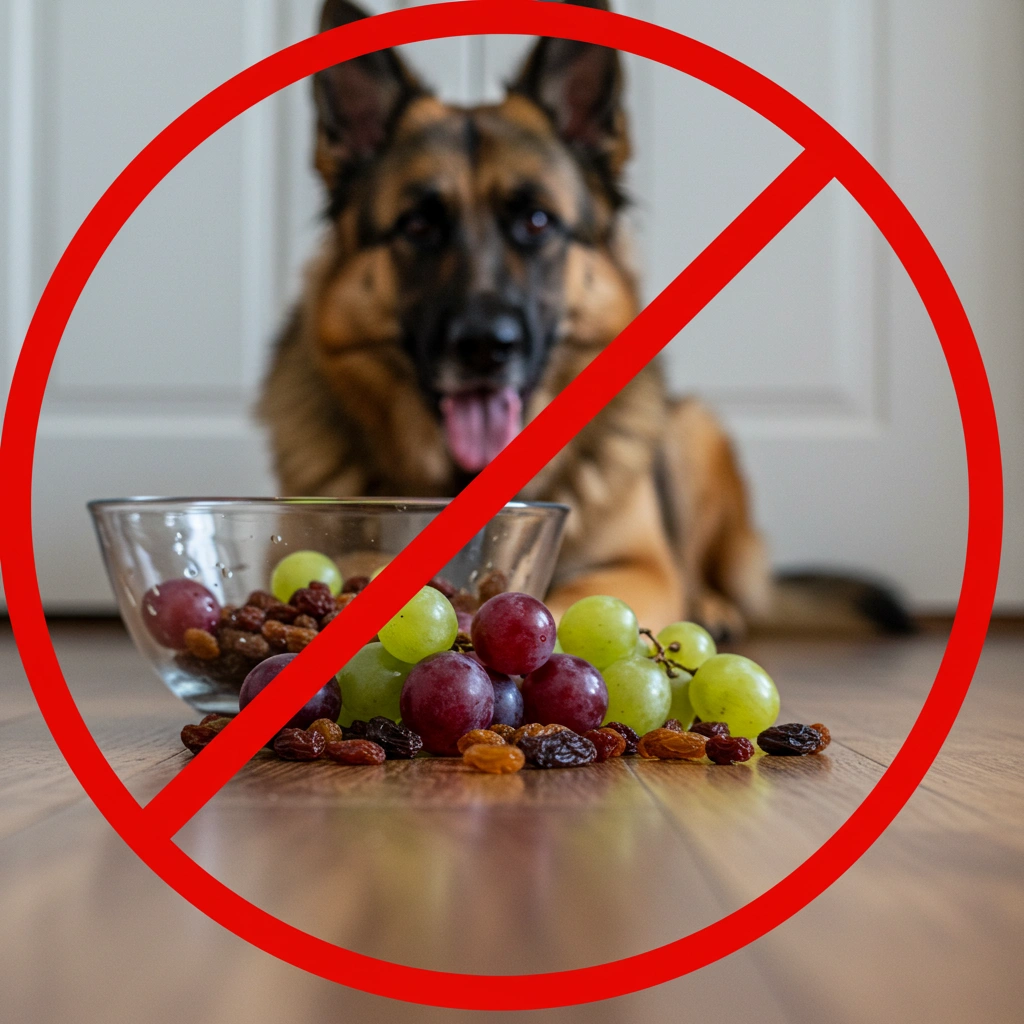
Risks & Symptoms:
- Vomiting or diarrhea
- Loss of appetite
- Lethargy or weakness
- Dehydration
- In severe cases, kidney failure, which can lead to death.
If your dog consumes grapes or raisins, seek veterinary care immediately, as kidney failure can progress quickly without treatment.
3. Onions & Garlic
Both onions and garlic contain compounds called thiosulfates, which are toxic to dogs and can cause oxidative damage to red blood cells. This can lead to anemia, a condition where the body lacks enough healthy red blood cells to carry oxygen to tissues. These foods are dangerous both in their raw and cooked forms.
Risks & Symptoms:
- Weakness or lethargy
- Pale gums
- Vomiting or diarrhea
- Abdominal pain
- Dark-colored urine due to hemolysis (red blood cell destruction).
Even small amounts of onions or garlic, especially over time, can have a cumulative toxic effect on dogs. If ingested, seek immediate veterinary help.
4. Avocado
Avocados contain a substance called persin, which can be toxic to dogs in large amounts. While humans can enjoy avocados safely, dogs can experience severe gastrointestinal upset, including vomiting and diarrhea, after consuming them. The highest concentration of persin is found in the avocado pit, skin, and leaves, so these parts should never be given to dogs.
Risks & Symptoms:
- Vomiting
- Diarrhea
- Lethargy
- Abdominal discomfort
- In severe cases, fluid accumulation around the heart or lungs can occur.
If your dog eats avocado, monitor them closely, and if symptoms appear, contact your vet for advice and treatment.
5. Xylitol (Artificial Sweetener)
Xylitol, a sugar substitute found in many sugar-free gum, candy, and baked goods, is extremely toxic to dogs. Even small amounts of xylitol can cause a sharp drop in blood sugar (hypoglycemia), which can be life-threatening. The risk is particularly high in products like sugar-free gum, but it can also be found in certain toothpaste and peanut butter.
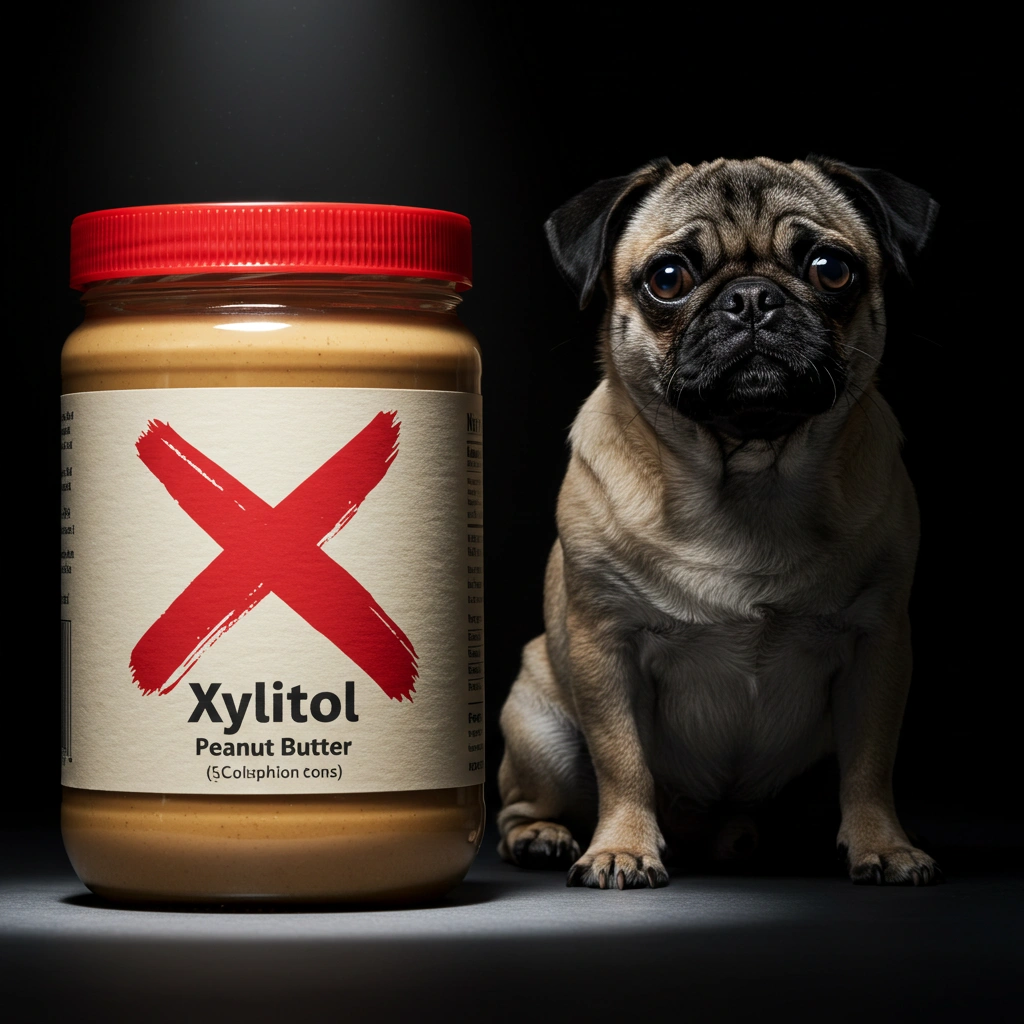
Risks & Symptoms:
- Sudden onset of lethargy or weakness
- Vomiting
- Loss of coordination or stumbling
- Seizures
- Liver failure (in severe cases).
If you suspect your dog has consumed anything containing xylitol, it’s critical to get veterinary care immediately, as the effects can be rapid and severe.
6. Alcohol
Alcohol is highly toxic to dogs and can cause a range of serious health issues. Dogs are much more sensitive to alcohol than humans, and even small amounts can lead to alcohol poisoning. Symptoms may appear after ingestion, and alcohol can depress the central nervous system, leading to life-threatening effects.
Risks & Symptoms:
- Vomiting or diarrhea
- Lethargy
- Lack of coordination or unsteady walking
- Decreased body temperature
- Respiratory depression or failure
- Organ failure, especially liver damage.
If your dog consumes alcohol, it is crucial to seek immediate veterinary attention, as alcohol poisoning can be fatal without prompt treatment.
7. Coffee & Caffeine
Coffee, tea, and other caffeinated beverages or foods are dangerous for dogs due to their caffeine content. Dogs are much more sensitive to caffeine than humans, and consuming even a small amount can cause serious health problems. Symptoms of caffeine poisoning are typically seen within hours of ingestion.
Risks & Symptoms:
- Restlessness or hyperactivity
- Rapid breathing or panting
- Increased heart rate
- Muscle tremors
- Seizures
- In extreme cases, caffeine toxicity can lead to death.
If your dog consumes coffee or any other caffeinated substance, take them to the vet right away for treatment, as the effects can be rapid and severe.
8. Macadamia Nuts
Macadamia nuts are known to cause a toxic reaction in dogs, though the exact toxin is still not well understood. These nuts can cause significant symptoms, even in small amounts. Dogs who consume macadamia nuts may experience weakness, tremors, and gastrointestinal issues.
Risks & Symptoms:
- Weakness in the hind legs
- Tremors or shaking
- Vomiting or diarrhea
- Hyperthermia (elevated body temperature)
- Lethargy.
If your dog eats macadamia nuts, take them to a vet immediately for supportive care, as symptoms can last for up to 48 hours in some cases.
9. Raw Yeast Dough
Raw yeast dough is a serious hazard for dogs, as it can cause bloating and severe stomach issues. The yeast in the dough ferments in the dog’s stomach, producing alcohol and gas, which can lead to alcohol poisoning and life-threatening bloating.
Risks & Symptoms:
- Bloating and distended abdomen
- Vomiting
- Abdominal pain
- Weakness
- Signs of alcohol poisoning, such as incoordination, vomiting, or lethargy.
If your dog eats raw yeast dough, get them to the vet immediately. This can be a life-threatening situation if not treated right away.
10. Bones (Cooked)
While dogs love chewing on bones, cooked bones can be extremely dangerous. Cooking makes bones brittle and more likely to splinter when chewed, which can cause severe injury to your dog’s digestive tract. Splinters can puncture the intestines, leading to infections, internal bleeding, and life-threatening conditions.
Risks & Symptoms:
- Vomiting or diarrhea
- Blood in stool
- Abdominal pain
- Difficulty swallowing or drooling
- Lethargy or weakness.
If your dog has consumed cooked bones, monitor them for signs of distress and contact a vet immediately if any symptoms appear. It’s always safer to give your dog raw bones under supervision, but even these can be risky in certain situations.
11. Citrus (Large Amounts)
Citrus fruits such as lemons, limes, and oranges can cause gastrointestinal upset in dogs if consumed in large quantities. The acids in citrus fruits can irritate a dog’s stomach, leading to discomfort and potential vomiting or diarrhea. While small amounts of citrus may not be harmful, it’s best to avoid giving them to your dog altogether.
Risks & Symptoms:
- Vomiting
- Diarrhea
- Drooling or excessive licking
- Abdominal pain or discomfort.
If your dog consumes large amounts of citrus, they may experience more severe symptoms, and it’s best to contact your vet for advice.
12. Cherries (Pits & Stems)
Cherries themselves are not highly toxic, but the pits and stems contain cyanide, which is poisonous to dogs. Cyanide can cause serious damage to a dog’s cells and affect the body’s ability to use oxygen, leading to poisoning. Consuming the pit or stem of a cherry can cause choking, intestinal blockages, or cyanide poisoning, making cherries dangerous for dogs.
Risks & Symptoms:
- Vomiting or diarrhea
- Difficulty breathing
- Dilated pupils
- Lethargy
- In severe cases, cyanide poisoning can cause seizures or death.
Always remove the pits and stems before giving your dog cherries, or avoid them altogether to be safe.
13. Mushrooms (Wild Varieties)
Wild mushrooms are particularly dangerous for dogs. While some mushrooms are safe, many wild varieties are highly toxic and can cause severe poisoning. Mushrooms that grow in the wild may contain toxins that can damage the liver, kidneys, or nervous system of dogs. Dogs are naturally curious, so they may ingest wild mushrooms, not realizing the potential danger.
Risks & Symptoms:
- Vomiting or diarrhea
- Abdominal pain
- Lethargy or weakness
- Tremors or seizures
- Liver or kidney failure (in severe cases).
If your dog consumes a wild mushroom, seek emergency veterinary care immediately, as mushroom poisoning can be fatal if not treated quickly.
14. Rhubarb
Rhubarb, while commonly used in pies and other desserts, is toxic to dogs. The leaves of the rhubarb plant contain oxalates, which can cause kidney failure and other severe symptoms if ingested by dogs. The stalks of the rhubarb plant are less dangerous, but it’s always safest to keep both the stalks and leaves away from your dog.
Risks & Symptoms:
- Vomiting
- Diarrhea
- Drooling or excessive salivation
- Abdominal pain
- Kidney failure (in severe cases).
If your dog consumes rhubarb, especially the leaves, contact a veterinarian immediately for treatment.
15. Nutmeg
Nutmeg is a common spice used in baking, but it can be toxic to dogs, especially when consumed in larger quantities. The active compound in nutmeg, myristicin, can cause neurological issues, and even small amounts of nutmeg can result in severe symptoms. It’s best to avoid giving nutmeg to your dog, even as a small part of baked goods.
Risks & Symptoms:
- Seizures
- Disorientation or confusion
- Increased heart rate
- Dry mouth
- Vomiting or diarrhea.
If your dog eats nutmeg, it’s important to contact your vet immediately for treatment, as the symptoms can worsen quickly.
16. Salt
Salt is an essential nutrient for dogs in small amounts, but consuming too much salt can lead to sodium poisoning. High levels of salt can disrupt a dog’s electrolyte balance and cause significant damage to organs, especially the kidneys. Foods with high sodium content, like chips, pretzels, or processed foods, should be kept away from dogs.
Risks & Symptoms:
- Vomiting
- Diarrhea
- Tremors or seizures
- Excessive thirst and urination
- In severe cases, kidney failure or death.
If your dog eats a large amount of salty food, watch for signs of poisoning and take them to the vet immediately for treatment.
17. Raw Eggs
Raw eggs pose two primary risks to dogs. First, they can carry the risk of Salmonella, which can lead to bacterial infection and cause vomiting, diarrhea, and fever. Secondly, raw eggs contain avidin, an enzyme that can inhibit the absorption of biotin (a B vitamin), which may lead to skin and coat issues over time if consumed regularly.
Risks & Symptoms:
- Vomiting or diarrhea
- Loss of appetite
- Fever
- Lethargy or weakness
- Skin problems with prolonged consumption.
If your dog consumes raw eggs, monitor them closely and contact a vet if symptoms of infection appear.
18. Raw Meat (Salmonella/E. Coli Risk)
Raw meat can be dangerous for dogs due to the potential presence of harmful bacteria such as Salmonella and E. coli. These bacteria can cause severe gastrointestinal distress and pose a risk to both dogs and humans. While some owners choose to feed their dogs a raw food diet, it’s important to understand the risks associated with raw meat.
Risks & Symptoms:
- Vomiting
- Diarrhea
- Fever
- Lethargy
- Dehydration.
To minimize the risk of infection, it’s better to cook meat thoroughly before feeding it to your dog, or consult a vet about safe ways to incorporate raw food into their diet.
19. Fatty Foods (Bacon, Fried Foods)
Fatty foods like bacon, fried foods, or greasy meat cuts can cause pancreatitis in dogs. Pancreatitis is an inflammation of the pancreas that can result in severe abdominal pain, vomiting, and diarrhea. Fatty foods are hard for dogs to digest and can lead to long-term health problems.
Risks & Symptoms:
- Vomiting
- Diarrhea
- Abdominal pain or tenderness
- Lethargy
- Loss of appetite.
If your dog consumes fatty foods and begins showing signs of pancreatitis, contact your veterinarian immediately, as it can become a serious, potentially life-threatening condition.
20. Ice Cream (Dairy/Lactose Issues)
While many dogs love the taste of ice cream, it’s not the best treat for them. Ice cream contains lactose, and many dogs are lactose intolerant, meaning they cannot properly digest dairy products. Eating ice cream can lead to gastrointestinal upset, including diarrhea and bloating.
Risks & Symptoms:
- Diarrhea
- Vomiting
- Abdominal discomfort or bloating
- Gas or flatulence.
It’s better to avoid giving your dog ice cream or other dairy products. There are many dog-friendly frozen treats available as alternatives.
21. Cinnamon (Irritation, Liver Damage)
Cinnamon may not be the first thing you think of when it comes to toxic foods for dogs, but it can cause problems if consumed in large quantities. Cinnamon contains compounds that can irritate the mouth and digestive tract, and excessive amounts can lead to liver damage over time.
Risks & Symptoms:
- Vomiting
- Diarrhea
- Drooling
- Abdominal discomfort
- Lethargy.
If your dog eats a large amount of cinnamon or cinnamon powder, it’s important to contact your veterinarian for advice.
22. Tobacco & Nicotine
Tobacco and nicotine are highly toxic to dogs, as they contain alkaloids that can cause rapid poisoning. Even small amounts of cigarette butts, nicotine gum, or tobacco products can cause severe symptoms, including nausea, vomiting, tremors, and seizures.
Risks & Symptoms:
- Vomiting or diarrhea
- Tremors or seizures
- Increased heart rate
- Lethargy or weakness
- In severe cases, death.
If your dog consumes tobacco or nicotine, immediate veterinary care is necessary, as nicotine poisoning can be fatal if not treated promptly.
How to Safely Introduce Human Foods to Your Dog
Introducing human foods to your dog’s diet requires careful attention to ensure their safety and well-being. Here are the steps to do it correctly:
- Begin by offering small portions of the new food to your dog. This allows you to monitor how they respond and reduces the risk of digestive issues or discomfort. Gradually increase the portion size if no negative reactions occur.
- Be alert for any signs of an allergic reaction, such as itching, vomiting, or diarrhea. If these symptoms appear, stop feeding the new food immediately and consult your vet for further guidance.
- When sharing human foods with your dog, always serve them plain and free from any added spices, oils, or seasonings. These ingredients can be harmful to dogs and may upset their digestive system.
- Before making significant changes to your dog’s diet, it’s wise to consult your veterinarian. They can help ensure that the new food aligns with your dog’s nutritional needs and health condition.
Emergency Steps if Your Dog Eats Toxic Food
In the unfortunate event that your dog consumes a toxic food, prompt action is essential to ensure their health and safety:
- First, determine what food your dog ate and the amount consumed. This information will be crucial when contacting a veterinary professional, as the treatment may vary based on the specific food and quantity ingested.
- If you suspect your dog has eaten something toxic, immediately contact your vet or call the ASPCA Poison Control hotline at 888-426-4435. They provide expert advice on how to handle poisoning cases and may direct you to the nearest emergency clinic
- Keep a close watch on your dog’s behavior and symptoms. Common signs of poisoning include vomiting, tremors, lethargy, or seizures. The sooner you notice symptoms, the quicker your vet can offer treatment.
- Avoid trying to make your dog vomit unless specifically instructed to do so by your veterinarian. In some cases, inducing vomiting can cause further harm, so always seek professional advice first.
Frequently Asked Questions(FAQ)
Can dogs eat peanut butter?
Yes, but make sure to choose a xylitol-free brand. Xylitol is highly toxic to dogs and can cause dangerous drops in blood sugar levels.
Is rice good for dogs?
Plain white rice is safe for dogs and can help soothe an upset stomach. It’s easy to digest and can be a beneficial part of a bland diet for dogs with digestive issues.
Why can’t dogs eat grapes?
Even small amounts of grapes or raisins can cause kidney failure in dogs. The exact toxin is unknown, but ingestion should be avoided at all costs.




